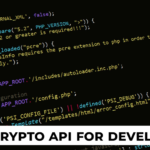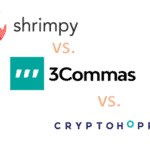In 2025, AI app builders are transforming development, enabling anyone—founders, non-coders, or developers—to build intelligent apps with ease. These platforms utilise AI to generate code, automate workflows, or add features such as chatbots and analytics, eliminating the need for coding. This guide explores the top AI app builders—Firebase Studio, Replit Agent, Windserve, Zed, Cursor, Lovable, Bold, v0, and Bolt—detailing their features, strengths, and pricing. Whether you’re launching a SaaS or prototyping an idea, these tools make AI-powered development accessible. Let’s dive into the best options for your next project.
Table of Contents
Best AI App Builders: Comparison
| Feature | Firebase Studio | Replit Agent | Windsurf | Zed | Cursor | Lovable | Bold | v0 by Vercel |
|---|---|---|---|---|---|---|---|---|
| Best For | Full-stack devs & teams | Non-coders, MVP builders | Teams, scalable apps | Collaborative AI coding | Semi-coders, refiners | Non-coders, full-stack apps | Startups, indie hackers | Designers, UI prototyping |
| AI Model/Agent | Gemini AI | Replit AI Agent | Cascade AI | Claude (Anthropic) | GPT-powered | Custom prompt-to-app | React + Node AI generator | Vercel AI engine |
| Frontend Tech | Next.js | HTML/CSS/JS (dynamic) | React + Tailwind CSS | Flexible (via Claude) | Any (VS Code based) | React + Tailwind | React (shipped UI) | React, Svelte, or Vue |
| Backend Support | Full (Firebase integrations) | Built-in DB/Auth | Yes | Manual | Yes | Supabase | Node.js + Prisma | Limited (Frontend only) |
| Ease of Use | Medium | Easy (even on mobile) | Medium | Dev-focused (Vim-like UI) | Easy | Very Easy | Easy | Very Easy |
| Real-Time Collab | Yes | Yes | Yes | Yes | Yes | Yes | Yes | Yes |
| GitHub Integration | Yes | Yes | Yes | Yes | Yes | Yes | Yes | Yes |
| No-Code Friendly | Partial | Yes | Partial | No | No | Yes | Yes | Yes |
| Pricing (Starting) | Free (3 workspaces) | Free; $25/month Core | Free; ~$10–30/month | Free; $18/month Claude Pro | Free; $20/month premium | Free; $20–100/month plans | Free; ~$100/month plans | Free; ~$20/month plans |
| Use Cases | IoT apps, social platforms | Chatbots, eCommerce MVPs | SaaS, team-based projects | Collaborative coding, AI UX | Refactoring, debugging | Landing pages, portals | Job boards, MVPs | UI prototypes, landing pages |
Top 10 Best AI App Builders
Firebase Studio

Firebase Studio, launched by Google in 2025, is a cloud-based, AI-powered platform for building full-stack web and mobile apps. Using advanced LLMs such as Gemini AI, it generates apps from natural language prompts, images, or sketches, supporting Next.js and over 60 templates. Features include code completion, debugging, real-time collaboration, and Firebase integrations (Auth, Firestore, Hosting). Its App Prototyping agent creates functional prototypes with one-click deployment.
- Best for: Developers and teams building AI-infused apps.
- Pros:
- Seamless Firebase and Gemini AI integration.
- Real-time collaboration and deployment.
- Extensive template library.
- Cons:
- Steeper learning curve for non-coders.
- Backend services may incur costs.
- Use Cases: Social platforms, IoT dashboards, games.
- Pricing: Free for 3 workspaces; Google Developer Program for 10 ($99/year); Premium for 30 (~$199/year).
Replit Agent
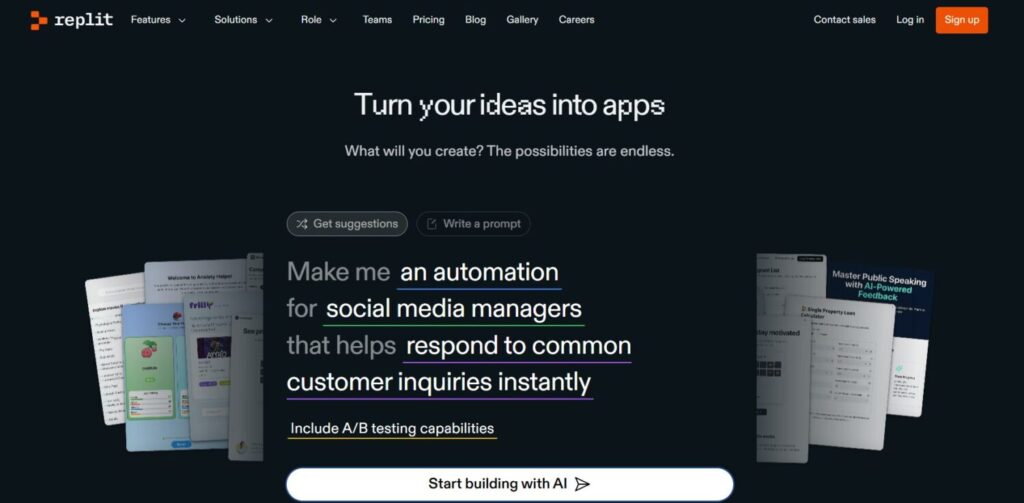
Replit Agent, integrated into Replit’s IDE, turns prompts into full-stack apps, handling code, environments, and deployment. Supporting over 50 languages, it offers real-time collaboration, automated coding tasks, and one-click hosting with built-in databases and authentication. In 2025, its mobile app enables app building on the go, ideal for non-coders and MVPs. However, it struggles with complex projects, often requiring manual fixes, per X feedback. It’s great for rapid prototyping but less robust for scaling.
- Best for: Non-coders and startups building MVPs.
- Pros:
- Mobile-friendly app creation.
- Automated setup and deployment.
- Supports diverse languages.
- Cons:
- Buggy for complex apps.
- Manual fixes are often needed.
- Use Cases: E-commerce sites, chatbots, dashboards.
- Pricing: Free tier; Core plan $25/month.
Windsurf

Windsurf, formerly Codeium, is an AI-powered code editor and app builder using its Cascade AI agent. It converts natural language into UI logic and code, supporting React and Tailwind CSS. Features include multi-file edits, GitHub integration, and VS Code extension support (e.g., Cline). In 2025, Windsutf’s automation suits teams, but its aggressive AI suggestions may need oversight. It’s ideal for rapid prototyping, though complex projects require review.
- Best for: Collaborative teams building scalable apps.
- Pros:
- Proactive AI-driven code suggestions.
- Seamless GitHub and VS Code integration.
- Fast multi-file editing.
- Cons:
- Over-aggressive AI can disrupt codebases.
- Learning curve for non-technical users.
- Use Cases: SaaS platforms, multi-file prototypes.
- Pricing: Free tier; paid plans ~$10-$30/month (estimated).
Zed
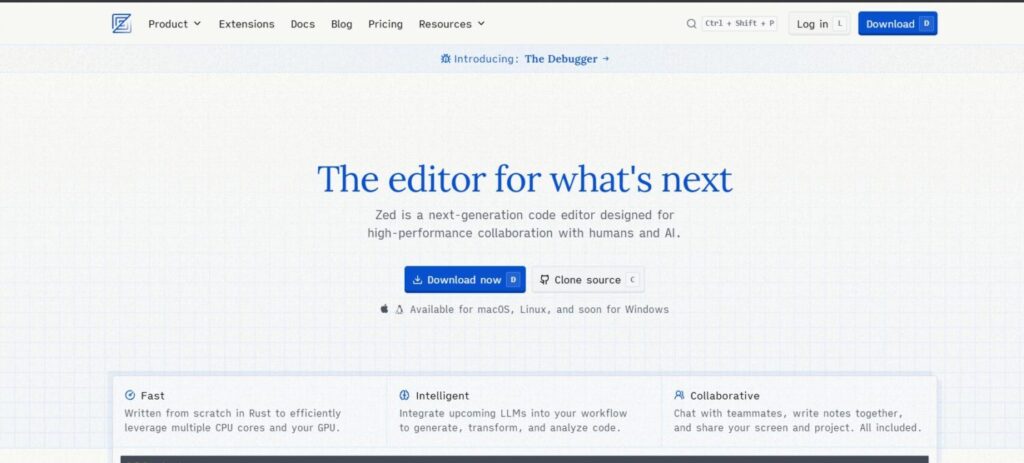
Zed, a next-generation code editor, offers AI-powered features via Anthropic’s Claude, including inline code transformations and real-time collaboration. Its /workflow command orchestrates complex file changes, with model flexibility (e.g., Copilot, Supermaven). Zed’s Vim-like interface suits developers, while no-code potential supports simpler apps. In 2025, it excels for team workflows, though its UI may challenge beginners. It’s a strong choice for collaborative coding.
- Best for: Teams needing collaborative AI coding.
- Pros:
- Fast, real-time collaboration.
- Flexible AI model integration.
- Intuitive inline transformations.
- Cons:
- Unfamiliar UI for VS Code users.
- Limited no-code features for non-coders.
- Use Cases: Collaborative apps, real-time prototypes.
- Pricing: Free for signed-in users; Claude Pro add-on ~$18/month.
Cursor
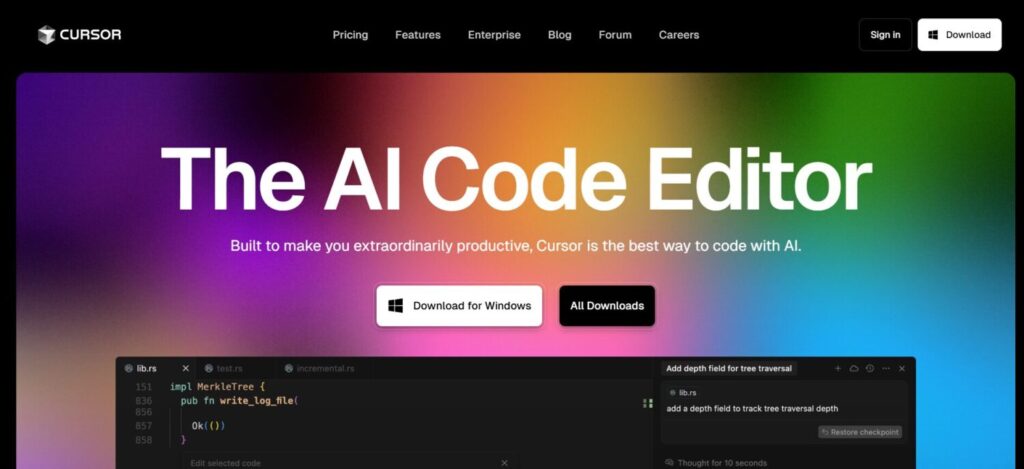
Cursor, a VS Code-based AI editor, enhances app building with GPT-powered code generation, refactoring, and debugging. It converts prompts into code, offering in-code chat and codebase queries. Features include smart rewrites and Figma-to-code integration. In 2025, Cursor’s intuitive design suits semi-coders, though it’s less autonomous than Firebase Studio. It’s ideal for structured coding but may need tweaks for large codebases.
- Best for: Semi-coders and developers refining codebases.
- Pros:
- Deep GPT integration for code suggestions.
- Beginner-friendly VS Code interface.
- Strong debugging capabilities.
- Cons:
- Less autonomous than Firebase Studio.
- Pro plan is needed for advanced features.
- Use Cases: Code-heavy apps, refactoring projects.
- Pricing: Free tier; paid plans ~$20/month.
Lovable

Lovable is a no-code AI app builder that turns English prompts into full-stack web apps. Features include React, Tailwind CSS, Supabase integration, visual UI editing, and one-click deployment. Its real-time collaboration and GitHub syncing suit teams and solo founders. In 2025, Lovable’s simplicity makes it a non-coder favourite, though it’s weaker for complex refactoring compared to Firebase Studio. It’s perfect for quick, functional apps.
- Best for: Non-coders building full-stack apps.
- Pros:
- Simple prompt-to-app generation.
- Fast Supabase and GitHub integration.
- Beginner-friendly interface.
- Cons:
- Limited for complex code refactoring.
- Higher-tier plans needed for scaling.
- Use Cases: Landing pages, client portals.
- Pricing: Free plan; paid plans $20-$100/month.
Bold
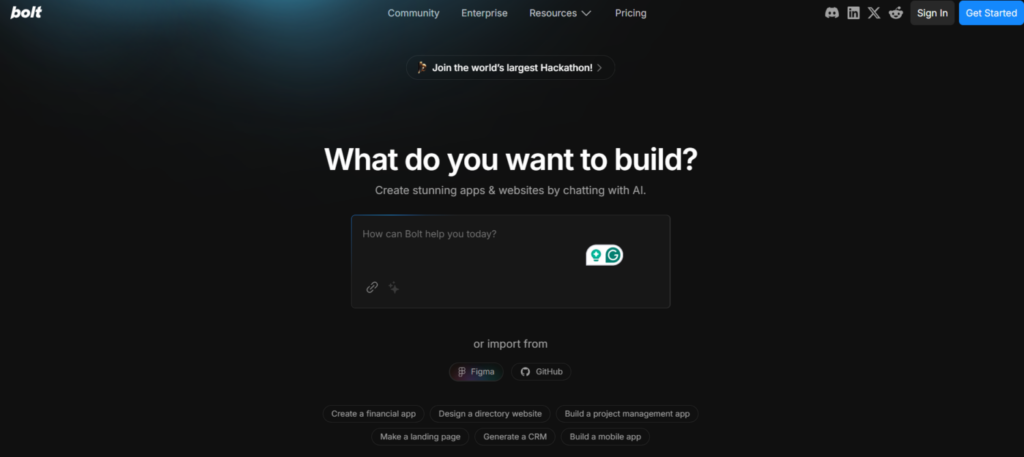
Bold (formerly Bolt.new) transforms prompts into deployable apps with React, Node.js, and Prisma backends. It generates frontend UI, backend logic, and database schemas (PostgreSQL, MongoDB), with GitHub export. Its high abstraction prioritizes speed, ideal for MCPs. In 2025, Bold suits indie hackers, though it offers less control than Firebase Studio. It’s great for rapid prototyping but may need tweaks for complex apps.
- Best for: Startups and indie hackers building MVPs.
- Pros:
- Fast prompt-to-deployable app creation.
- Supports multiple database integrations.
- Clean, customizable UI components.
- Cons:
- Limited architectural control.
- Paid plans required for advanced features.
- Use Cases: Job boards, e-commerce MVPs.
- Pricing: Free tier; paid plans ~$100/month.
v0
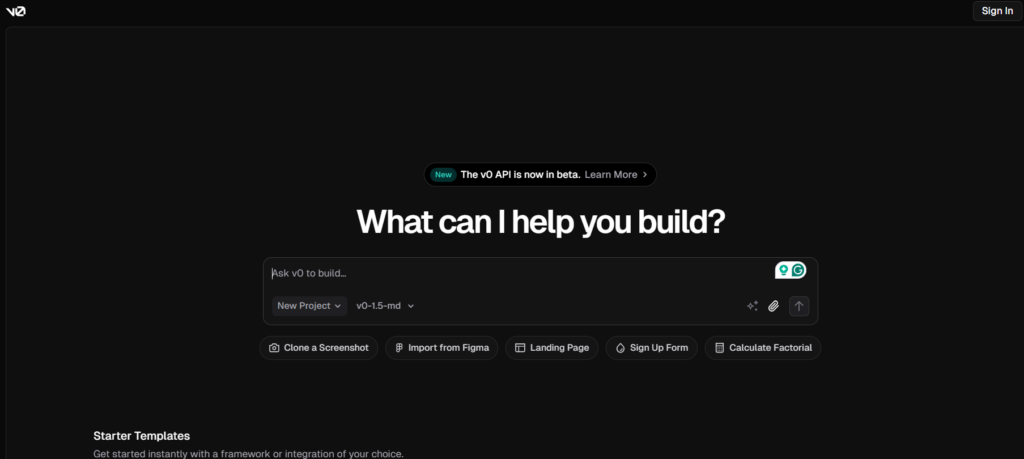
v0 by Vercel generates front-end UI in React, Svelte, or Vue from text or image prompts, using Tailwind CSS and shadcn/ui for responsive designs. It offers real-time chat-based refinement and GitHub integration. In 2025, v0 excels for designers needing polished UIs fast, though it’s frontend-focused compared to Firebase Studio. Its collaborative features make it ideal for UI prototyping.
- Best for: Designers and founders creating UI components.
- Pros:
- Fast text-to-UI generation.
- Real-time design iteration.
- Seamless GitHub integration.
- Cons:
- Frontend-focused, limited backend support.
- Requires coding for full-stack apps.
- Use Cases: Landing pages, UI prototypes.
- Pricing: Free tier; paid plans ~$20/month.
Best AI App Builders: Conclusion
In 2025, AI app builders like Firebase Studio, Replit Agent, Windserve, Zed, Cursor, Lovable, Bold, v0, and Bolt will empower everyone to create smart apps. Firebase Studio and Bolt excel for full-stack development, Replit Agent and Lovable simplify for non-coders, and v0 shines for UI design. Cursor and Zed enhance coding, while Bold speeds up MVPs. Test free tiers—Replit Agent for mobile ease, Lovable for simplicity. With AI driving innovation, these tools make app development fast and accessible. Start building your idea today.
Frequently Asked Questions (FAQs)
What are AI app builders, and who can use them?
AI app builders are platforms that use artificial intelligence to create apps from prompts, images, or sketches, without coding. In 2025, tools like Firebase Studio and Lovable suit non-coders, startups, and developers. They generate code, add features like chatbots, or automate deployment, saving time. Whether you’re a founder building an MVP with Replit Agent or a designer crafting UI with v0, these tools are accessible to anyone with an idea, no programming skills required.
Which AI app builder is best for beginners?
For beginners, Lovable and Replit Agent shine in 2025. Lovable’s prompt-to-app interface creates full-stack web apps with minimal effort, starting free. Replit Agent’s mobile-friendly platform simplifies MVPs with automated hosting, at $25/month for Core features. Both offer templates and intuitive controls, ideal for non-coders. Start with Lovable for web apps or Replit Agent for mobile flexibility, then explore Firebase Studio as you grow comfortable with AI-driven development.
Can AI app builders handle complex projects?
Yes, tools like Firebase Studio and Windserve manage complex projects in 2025. Firebase Studio integrates Gemini AI and Firebase services for scalable apps, supporting social platforms or IoT dashboards. Windserve’s multi-file editing and GitHub integration suit intricate SaaS projects. However, Replit Agent may struggle with bugs in large apps, per X feedback, and Bold offers limited control. For complex needs, pair AI tools with developer oversight to ensure robust performance.
Are AI app builders cost-effective for startups?
AI app builders are cost-effective for startups in 2025, reducing developer costs. Free tiers from Firebase Studio, v0, and Replit Agent let you test ideas, while paid plans ($20-$100/month) offer scalability. Firebase’s $99/year Developer Program supports multiple apps, and Bolt’s $100/month plan speeds up full-stack development. Though advanced features or backend costs (e.g., Firebase services) can add up, these tools save time and money, making them ideal for lean startups.
How do AI app builders differ from traditional no-code tools?
AI app builders, like Firebase Studio or Bold, use AI to generate code and features from prompts, offering smarter automation than traditional no-code tools (e.g., Bubble). Traditional no-code platforms rely on drag-and-drop editors, limiting complexity. AI builders provide more flexibility and speed, though some, like Zed, require coding knowledge for optimization, bridging no-code and developer workflows.






